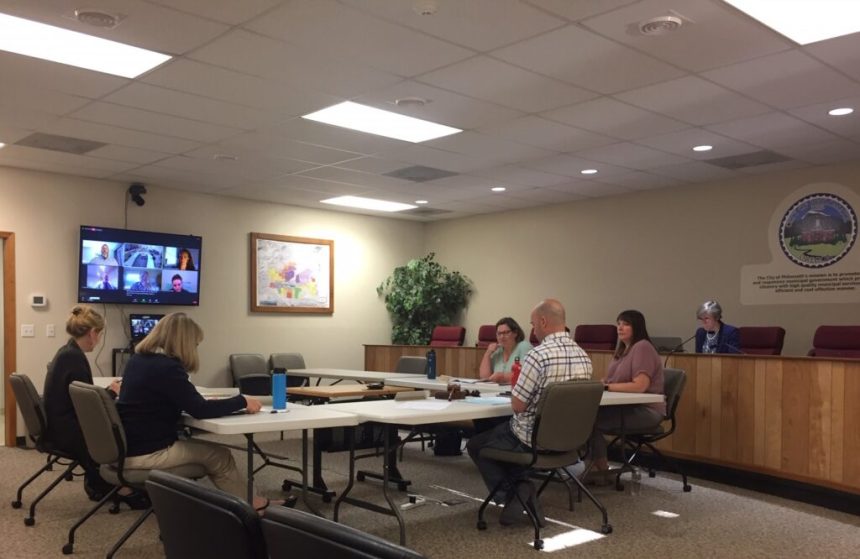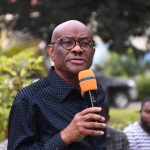Members of the Philomath City Council vote to refer a two-year moratorium to voters. The Oregon Government Ethics Commission agreed Friday that councils like these deserve more clarity from state officials on the use of communications and public meetings law.(Mike McInally/Oregon Capital Chronicle)
Leaders of Oregon’s Government Ethics Commission agreed Friday that there isn’t enough clarity surrounding their recently-acquired power to ensure public officials only make governing decisions in front of their constituents, leaving the door open for future legislative action or additional guidance from the commission.
During a discussion on communications and public records law, members of the statewide ethics board raised questions about the implementation of House Bill 2805, a 2023 law passed by the Oregon Legislature which gave the nine-member commission the power to investigate and train public officials across the state to comply with public meetings law. The commission is investigating the Salem City Council for such violations in a novel case, an issue that Commission Chair David Fiskum said could come to the board in its September meeting.
The 2023 legislation aimed to crack down on what the law calls “serial communications,” in which a majority of members of a governing body discuss issues relevant to their work and make decisions outside of the public eye in text messages, emails or private meetings. It’s long been illegal for a majority to meet and make decisions outside of public meetings.
Illegal serial communications could include one council member working to coordinate and deliver messages to a majority of the governing board before a meeting.
The law, however, does not aim to crack down on public staff aiming to collect background information or data or officials speaking with the media or engaged citizens. Fiskum told members of the body on Friday that lawmakers may act to further clarify the law in the 2027 legislative session, when they’ll have more time than 2026’s 35-day short session.
“That reality will carry implications for our administration of this law, as well as for public policy in general,” he said. “Internally, that inability to change things until 2027 means that all of us will have to live with sometimes longer agendas.”
The law sparked debate and confusion statewide about the appropriate bounds of conduct when it comes to public meetings. The ethics commission advised members of the Salem City Council in late July that they are allowed to attend neighborhood association meetings and speak with the media after an initial state ethics investigation found that its mayor and city councilors held an illegal serial meeting prior to the resignation of a city manager.
In another case, Patricia Mulvihill, executive director of the Salem-based League of Oregon Cities, wrote to the ethics commission in May, saying the agency had a “gross misinterpretation” of the law’s enforcement via trainings delivered to Portland city councilors since November 2024, as reported by the Oregon Journalism Project. In one training, according to the letter, officials were told a mayor’s comments to a local newspaper about city business could raise a potential violation.
Legislation likely
The acrimony has already caught the attention of one Salem lawmaker, who warned of an unintended chilling effect on effective collaboration among elected officials. Rep. Kevin Mannix, R-Salem, requested the commission pause enforcement of the law until May 2026 for further legislative clarity in a July 23 letter.
“In conversations with colleagues at both the state and local levels, it has become apparent that the fear of inadvertently violating public meetings requirements is discouraging legitimate, informal discussions among elected officials,” Mannix wrote to the commission. “This is particularly problematic when officials are trying to gather information, understand complex issues, or develop thoughtful policy proposals before bringing them forward for formal public consideration.”
The commission rejected Mannix’s request on the grounds that state law requires them to move forward with enforcement. But commissioners on Friday parsed through a Frequently Asked Questions document, aiming to assuage some of those fears.
That document details how violations of state open meetings law require that a quorum of elected officials be in communication and that those communications include discussing decisions they’ll make. For instance, four of seven city councilors calling each other to talk about lowering parking fees would constitute a violation, but those four city councilors texting each other about a sports team would not.
Susan Myers, the commission’s executive director, called the FAQ a “living document.”
“I want to stress, because everyone has been saying, ‘You guys need to rescind this,’ It’s not a matter of rescinding it.” she said. “There may be fine-tuning that we do to examples or adding or deleting questions as time goes on and as the commission has more opportunity to consider the specific issues.”
The FAQ notes that meeting with a neighborhood association or discussing business that is outside of the governing body’s work is not a violation, but not all commissioners were convinced the guidance was clear enough. One key question was the extent to which members of a communication chain would all be impacted. For instance, should the original sender be implicated for sending a message that spiraled into backroom negotiations they weren’t a part of?
“Somebody else may share your communication and down the line it may become a quorum, and ergo, you may be violating public meetings laws,” said Commissioner Shenoa Payne. “To me, I mean as a lawyer, it seems like a tough pill to swallow.”
Myers said she’s been talking with key stakeholders about the issue, including a leader of the effort to pass the 2023 law, Rep. Nathan Sosa, D-Hillsboro. She said legislative action could be forthcoming as soon as the 2026 legislative session, but that she would prefer receiving advice from the Oregon Law Commission as well, a nonpartisan law reform body that was established in 1997 with the goal of identifying gaps in existing law.
SUBSCRIBE: GET THE MORNING HEADLINES DELIVERED TO YOUR INBOX









